
views
Meeting Basic Qualifications

Make sure you’re old enough to qualify for a mission trip. Organizations may have different standards regarding an appropriate age for traveling. Some require you to be 18, while others may prefer older applicants. Before going any further, make sure you find a program that fits your age group.

Get involved in your church. Missionary organizations are looking for applicants who are fully committed to their faith. The best way to demonstrate this is by volunteering for and helping out your congregation whenever possible. This is also a good way to confirm that you’ll be doing it for the right reasons. If you find getting more involved at your local church taxing, missionary work may not be for you.

Fully commit yourself to the faith by volunteering and reflecting. Doing mission work overseas can be an emotionally draining experience. You may have to rely heavily on your faith in order to get through tough times. Some interview processes may actually include prayer or a faith-based reflection time. Spend quiet time to yourself and try your best to get as involved in Christian organizations as possible.

Meet any professional credentials. Some groups will be primarily looking for those with a specific professional skill set, be it medical, educational, or lingual. If you are looking to do industry-specific work in another country, make sure your credentials align with theirs. Others may require a high school or college degree, so be on the lookout for that as well.

Familiarize yourself with other languages. Lingual education is often included as part of the training process, but it is not guaranteed. Many missionary groups end up traveling to foreign countries with a different native tongue. Some organizations may actually require a background in the foreign language prior to applying, so prepare yourself for that as well.
Researching and Choosing a Missionary Organization

Consult with your pastor about mission trips. The pastor at your congregation is most likely a helpful and easily available resource. They will know if your church has any upcoming mission trips planned or will be able to refer you to familiar organizations. They may also provide advice to make sure mission work is the right path for you.

Reach out to a mentor. It’s very likely someone at your place of worship has been a missionary before. Ask questions and listen to their experiences intently. Chances are they’ll have a wealth of knowledge to share about the pros and cons of mission work. Some questions to get you started are: Why did you become a missionary? What did your daily routine look like? What kind of lifestyle adjustments did you have to make before leaving? Was there anything you wish you had known prior to leaving? Did the trip end up helping your faith grow?
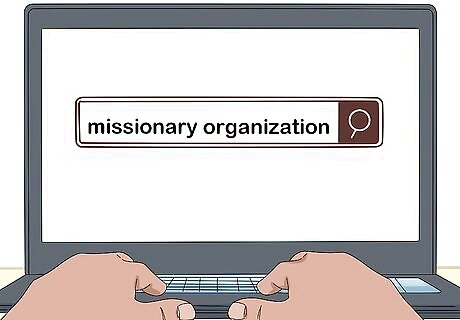
Investigate several different missionary organizations. Every group will have a faith-based methodology for its programs. Catholic groups can have differing philosophies from Protestant ones. Make sure to pick one that lines up perfectly with your own ideals. Your pastor or members of your congregation can have great insight into this.
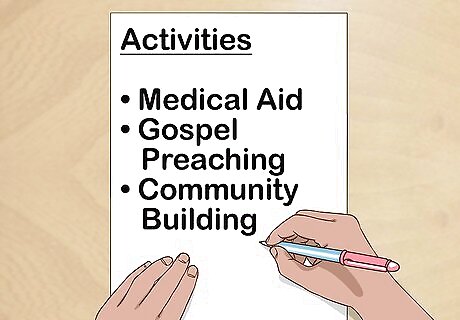
Narrow down your areas of interest. Some mission trips will focus on solely promoting Christianity in foreign countries, while others will have more tangible activities for you to complete. These can vary greatly from constructing homes and installing wells in villages to promoting literacy programs and providing medical support. Try making a list of activities you’re most interested in and well equipped at completing. Focus on the groups that entail that kind of work.
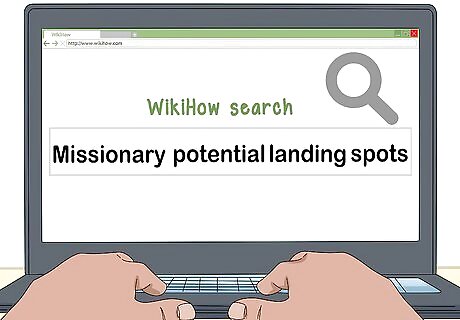
Research potential landing spots. Many mission trips are based in developing countries, but some stay within the United States or travel to more developed countries. Familiarize yourself with the languages, culture, and geography of the places you plan to work in. Some organizations will let you have a say in where you end up, while others may assign you a location. Be sure to cross check your areas of interest with an organization’s religious philosophy and location options.

Speak with an immigrant from any potential countries. It’s possible that an immigrant from one of the countries on your list will live in your area. See if your city has a non-profit organization or community center for immigrants from that specific country. Reach out to them personally and listen to their stories.
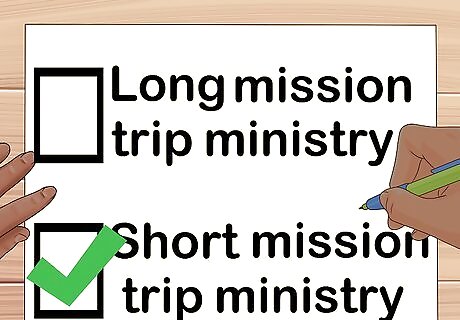
Choose a program that meets your length preferences. Mission trips can vary greatly in terms of sheer length. Some may only last a week or two, while others can last years at a time. If you have a family and steady employment back home, you may want to stick to shorter trips. If you don’t have much tying you down, longer mission trips may be the route for you.
Completing the Application and Interview Process
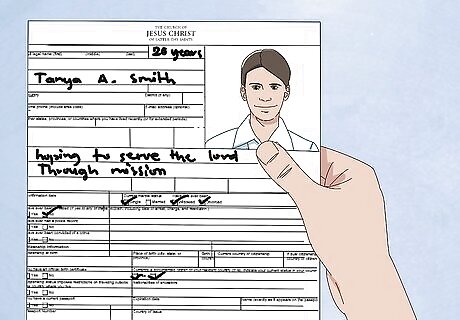
Create an application portfolio with thoughtful personal essays. Fill out any necessary applications and write the required personal essays well before your desired start date. Keep in mind that your personal essays will be an integral part of the application process. The essay questions will vary between organizations, but make sure to emphasize your motivation and purpose for wanting to promote Christianity and help out those in need.

Bring essays and references with you to interviews. It can never hurt to be too prepared. Have a paper copy of your essays in tote, as well as contact information for references.

Complete the interview process. Just like the application itself, the interview will vary from organization to organization. Most interviews entail questions from the program’s staff, but be prepared to do any of the following: Engage in prayer and thoughtful reflection Speak with a clinician about any potential health risks Talk candidly about your faith Consent to a background check
Preparing to Leave

Clear yourself of any debt before you leave. It will be difficult to kickstart a life overseas if you have outstanding debt from student loans, a mortgage, or credit cards. Your options may include: Making payments until the debt is cleared. Looking into deferment options. Some may be available for those participating in non-profit work. Seeing if any relatives or close friends can pay interest on the debt while you’re overseas.

Develop healthy habits prior to leaving. While overseas, your diet and daily rituals will change drastically. If you have a history of medical complications, make sure to fully disclose that to the program’s clinician. A few healthy tips to look into leading up to your trip include: Exercising regularly Breaking unhealthy eating habits, like consuming junk food or having irregular meal times Adjusting your sleep schedule to that of the program’s schedule Taking vitamins and supplements to avoid falling ill prior to your trip
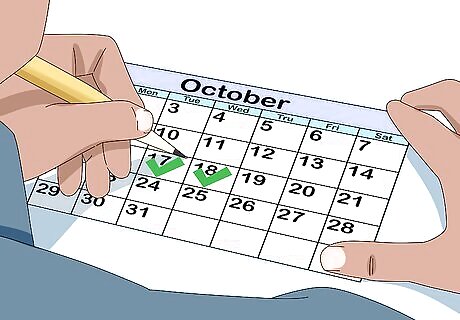
Clear your schedule to complete training. The length of the training process can vary from group to group. Expect to spend anywhere from six months to one year in their training programs before entering the field. Some will require you to relocate for this; others can be done remotely online.

Pack according to your program’s guidelines. Start packing early. This will give you plenty of time to include things you may forget at the last minute. Each training program should provide you with a list of recommended items to pack. Be prepared to adhere to their regulations about what can and cannot be brought with you. Oh, and wean yourself off anything that plugs in. Outlets and/or electricity may not be readily available in the field.










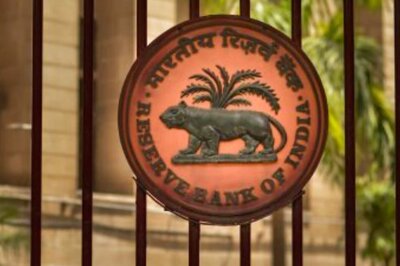
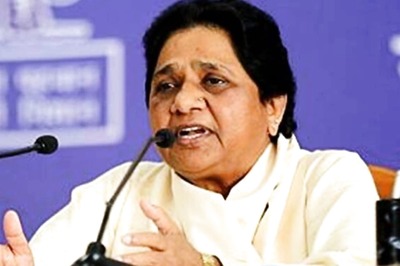


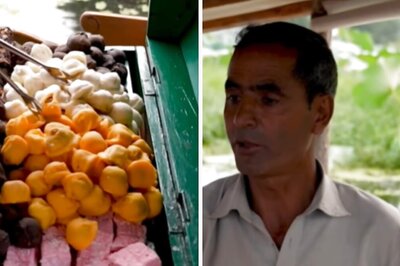

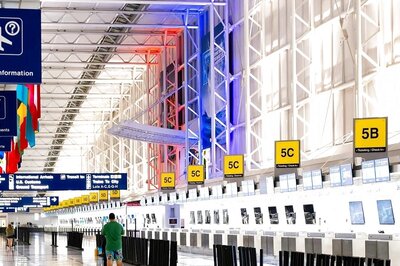


Comments
0 comment